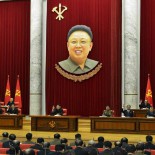Revaluation Reflux
In the latest installment of “For the Love of Money“ Choson Sinbo features several stories about the DPRK’s “currency exchange” which may be the closest thing Pyongyang watchers get to an official announcement. Choson Sinbo carries an interview with Cho So’ng-hyo’n, a senior official of the DPRK Central Ban and reports: “Denying speculation that this currency exchange action is a step in the direction of a free-market economy, responsible official Cho So’ng-hyo’n stressed that socialist principles and order will be far more solidly cemented in the managing of the economy. He also expressed his opinion that the market’s role will gradually dwindle as the state’s economic capability is enhanced as more domestically-produced commodities are distributed through state-run networks for commerce.”
Choson Sinbo also reports that prices in the DPRK will revert to July 2002 level. Mr. Cho also remarked: “The market was utilized as a supplementary means based on the principle of socialist economic management. We believe that, as the capability of the state has strengthened, the role of the market–which has performed its function as a supplementary means–will gradually dwindle.” Mr. Cho also reports that “that absolute majority of working people, including workers, farmers and office workers have expressed welcome and support saying that the state measure taken this time is most correct, and favorable reactions are being reported.”
But are there really “favorable reactions?” Asahi Shimbun citing Seoul-based sources with knowledge of “reports from west European countries’ diplomatic corps in Pyongyang, have also confirmed the existence of information about citizens having staged protests in several places of Pyongyang City. It appears that there have been incidents of some people rebelling against the North Korean authorities’ decision to exchange currency and some angry people protesting.” There are also reports that some North Korean citizens had insider information prior to the currency exchange policy being announced.
Meanwhile, Choson Ilbo reports that KPA troops posted to the Ministry of Public Security remain on high alert for public protests against the currency exchange. There are also reports that the recently expired won notes have been found defaced and discarded in garbage heaps outside cities in North and South Hamgyong, as well as outside Pyongsong, South Pyongan. What’s more State Security Department KPA soldiers stationed along the DPRK-PRC border are under order to shoot North Korean citizens attempting cross the border.
It is unlikely if public protests will reach a critical mass. The DPRK internal security apparatus was placed on high alert prior to the announcement of the currency revaluation, and they present as more than willing to react aggressively. That said, previous popular protests in communist regimes, such as Hungary and the Czech Republic/Slovakia only fomented when the central authorities implemented highly restrictive banking policies.




